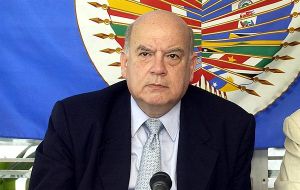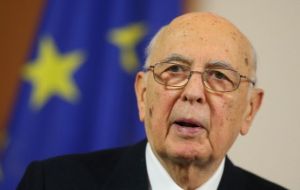MercoPress. South Atlantic News Agency
OAS chief and Pope Francis talk drugs, Chile’s coup and Latam’s coming challenges
 The Pope was very much interested in current events occurring in Latin America
The Pope was very much interested in current events occurring in Latin America  Insulza said that the Latam virtuous economic cycle of the last decade will be less active in the next
Insulza said that the Latam virtuous economic cycle of the last decade will be less active in the next  Napolitano recalled Italy’s deep admiration for the return of democracy in Chile
Napolitano recalled Italy’s deep admiration for the return of democracy in Chile The Secretary General of the Organization of American States (OAS), José Miguel Insulza, was received in a private audience by Pope Francis in Vatican City and by the President of Italy, Giorgio Napolitano, in the framework of a visit to Rome at the invitation of the Italianaeuropei to give a lecture during the commemoration of the 40th anniversary of the military coup in Chile.
During the meeting with the Pope, which took place in the private office of the head of the Catholic Church, both leaders discussed the world’s current events, with particular attention to those occurring in Latin America. The situation of young people and seniors, as well as human rights and the Report on the Drug Problem in the Americas were also discussed by the Pope and Insulza. Pope Francis showed particular interest in this region’s context and received from Insulza a thorough synthesis of the times that North, South and Central America, as well as the Caribbean are going through.
At the conference held by the Italianaeuropei Foundation, chaired by former Italian Prime Minister Massimo D’Alema, the head of the OAS recalled that the September 11, 1973 coup against the government led by elected Salvador Allende occurred at the heart of the darkest period in Latin America’s history, “full of national security dictatorships in the Southern Cone and civil wars in Central America. During that period of obscurantism, Augusto Pinochet’s dictatorship was noted for its arrogant brutality.”
Insulza added that “Pinochet became, and remains today, the most hideous face of Latin America’s dictatorships.”
“The coup led by General Pinochet destroyed democracy in Chile and spawned a bloody dictatorship that through summary executions, enforced disappearances, torture and mass incarceration, the exile of hundreds of thousands of persecuted people and the suppression of all freedoms and rights of citizens, would become a symbol of human rights violations in the world”. Besides generating widespread popular rejection and a wide international solidarity that Chileans still remember with gratitude.
According to Insulza, the debate during the exile years contributed to the creation of the Coalition of Parties for Democracy (Concertación de Partidos por la Democracia), which led to victory—in the plebiscite of 5 October, 1988, that ended the dictatorship of Pinochet—the party that, from then on, ruled Chile for twenty years.
“It was the expression of the historical convergence of Christian and Socialists forces, which had been opposing in 1973, and then were able to forge an alliance and a majority that still exists,“ he said.
In the final part of his speech, the head of the OAS asserted that ”the times and the demands of society have changed, because we made them change. Progressism means never being satisfied with what has been achieved, but to look for permanent improvements in democracy and society.“
However ”we still want to change our society with more democracy; young people, who demand more freedom, better education, more job opportunities, effective inequality reduction, and better models of political organization, are part of the democratic movement and take the place we forged with our effort and with your solidarity“.
President Napolitano delivered a message to Secretary General Insulza, which was read during the Conference, in which the Italian dignitary recalled that the ”bloody overthrow of the constitutional order“ in Chile gave birth to a ”global debate on the transformation processes of economic and social structures and the risks to political and democratic institutions.“
President Napolitano highlighted the deep solidarity with the Chilean people that the Pinochet coup d’état inspired in his country and recalled the ”deep admiration“ felt by his countrymen on ”the return of democracy in Chile and the subsequent evolution of the political, economical and social life” that took place in the South American country.
During his visit to Rome, Secretary General Insulza also gave a lecture at the Italo-Latin American Institute in which he called on countries of the region to take action, because the boom cycle of Latin America’s economy is close to exhaustion.
“The virtuous economic cycle of the last decade will be less active in the next, which does not mean a negative economic growth, but a more difficult economy over the years,” he added.
Insulza emphasized that the starting point to address the new cycle is positive, following the high growth rates in the region in the last decade and the way in which Latin America avoided the effects of the global crisis that broke in 2008. All these factors, he reiterated, were used by most governments of the Hemisphere in order to reduce poverty, increase social services and generally strengthen democracy, as evidenced by the “unusual” fact that all elections held in the region since 2005 have been deemed fair by all international observers.
The head of the OAS concluded by mentioning the challenges facing the region in the near future, among which he highlighted poverty, inequality and, in particular, security, with Latin America’s homicide rate at over twice the world average




Top Comments
Disclaimer & comment rulesCommenting for this story is now closed.
If you have a Facebook account, become a fan and comment on our Facebook Page!